#Lebanon's economic struggles
Text
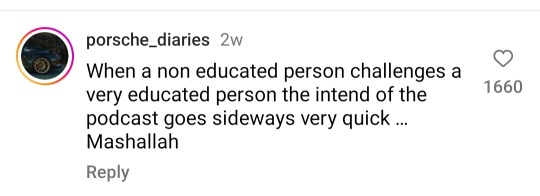
this zionist cuck is always getting bodied on his own show lmaooo
#Lebanon's economic struggles#American politics#Middle East turmoil#geopolitical interference#Lebanon#impoverished#struggling country#American invasion#interference#Taliban#Middle East#American interference
149 notes
·
View notes
Text
Today, the PA lacks any political legitimacy to mask its role as a second South Lebanon Army for Israel. The continued theft of land and the denial of rights of the refugees of the Gaza Strip, as well as the rest of the Palestinians, bestowed a duty upon Hamas and the resistance factions to launch the attack to break the status-quo. Oslo failed to free the Palestinian prisoners as promised by PLO officials, and the right of return was similarly sidelined; the Great March of Return in 2018 was crushed by the kneecapping of protestors in their hundreds. The international community cheered on, hoping to trap both Gaza and the West Bank with its own standards of passive resistance, statebuilding, and individualist economic prosperity that hides itself behind the veil of a collective effort to produce the New Palestinian to the world.
The significance of the October 7th assault thus becomes clearer: it was an attack not only against Israeli settler colonialism, but also against the fundamental discourse that underlies the PA. It broke the taboo on centering Palestinian rights through the lens of decolonial and revolutionary armed struggle. More importantly, it scathed the colonial hubris of a nuclear-armed beast that boasts of its weaponry and supposed military superiority to the world when ‘mowing the lawn’ in Gaza. No wonder, then, why the international community is cheering on the destruction of Gaza and the elimination of resistance. Out of fear that Hamas would break the perpetual stalemate that the PLO signed on to in 1993, the US wants to quench the Zionist bloodthirst that ensued after October 7th through JDAMS, Delta Force squadrons, and a media clergy that parrots every Israeli army claim that demonises not only the Resistance, but the entire population of Gaza. The entire Israeli political spectrum is united around portraying Palestinians as Nazis, ISIS members, ‘children of darkness’, as well as human animals in order to manufacture worldwide consent for the continuous bombardment of the Gaza Strip.
It is already clear that October 7th will become a landmark moment in the history of Palestinian resistance against Zionism, its benefactors, and its local agents. The PA, US, and Europe are encouraging the massacre and total siege of the Gaza Strip, not only because of their inherent interest in the continued existence of Israel on Arab land, but also because of their frenzied desire to try and restore the status quo, an imagined reality that existed before October 7th. Attempts to soften Hamas’ position on liberation via the Quartet and Qatar never bore fruit, as evidenced by what has transpired since. The failure of the peace dividends to thwart the Palestinian people, the collapse of the political discourse that masks securitisation behind a national goal, and the continued will of the resistance groups in Gaza to fight despite an international siege and soft power tactics to entice them to stay silent – all of this will pave the way for a more revolutionary discourse with regards to liberation. The era of pseudo-statebuilding is finally behind us, and an age of liberation is coming.
134 notes
·
View notes
Text
"In accordance with the program of their 1968 second congress, the Lebanese communists considered Lebanon as a capitalist country with bourgeois relations of production prevailing in most sectors, including agriculture. But in spite of its relatively advanced level of development in the region, Lebanon still remained dependent on foreign capital: it was a country with distorted social and economic
structures, with the service sector dominant over the main and vitally needed productive sectors. According to the congress, the attempted reforms by the big bourgeoisie forces were doomed to failure because 'they did not get at the root and main causes of the crisis: the supremacy of the financial oligarchy, which fully controlled the economic and political destiny of the country, and the dependence of the Lebanese economy on neocolonialism.'
The necessary task ahead was therefore to 'establish national democratic power and complete the stage of the general democratic struggle, preparing the ground for the transition to socialism.' The party called for setting up 'a national democratic regime representing the alliance of the workers, peasants, urban petty bourgeoisie, revolutionary intellectuals and those sections of the middle bourgeoisie linked with domestic industrial and agricultural production.' If it gained power, such a regime would liquidate the assets of foreign (predominantly American) monopoly capital, nationalize the holdings of Lebanese financial capital, establish a public sector assuming control of foreign trade, develop the industrial sector, and enact farreaching agrarian reforms."
Tareq Y. Ismael and Jacqueline S. Ismael, The Communist Movement in Syria and Lebanon (1998)


35 notes
·
View notes
Text
New Rho Under Siege
CW: discussion and a few images of urban conflict some may find disturbing. I've tried to avoid any actual depictions of death however.
The Locked Tomb series receives a lot of gushing praise (quite rightly) for its intricate and complex depictions of relationships and love, sexuality and gender. But something I've seen less praise for (though I'm sure it exists) is the incredibly rich depiction of what an urban environment during warfare and civil strife looks like.
One of the unfortunate facts of urban warfare is that civilians are almost inevitably present, even in the most dire circumstances. Take the Bakhmut as an example. Despite months of fighting, thousands lived on in the city and region right to at least the very closing moments. This is despite the city being essentially entirely destroyed.
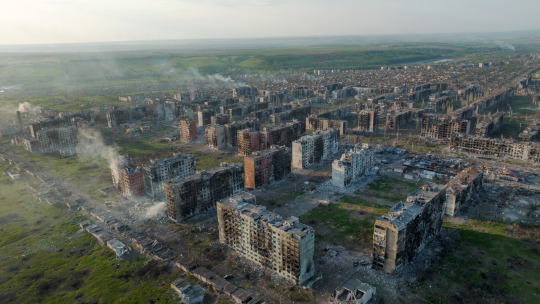


👆 civilians still lived through these conditions.
New Rho in Nona the Ninth feels incredibly lived in. The city supposedly contains ~9 million people, and you can believe it. There are all sorts of people, there are different groups and socio-economic areas, people have different responses to the situation they find themselves under, but they all living complex lives. This goes well beyond the key characters or even the side characters, but is captured by the existence of a barter economy, background vigilante and militia groups, the daily grind of workers desperately seeking ad hoc jobs.
They walked alongside all the other workers - the ones who didn't get picked up in the morning in the worker vans, or didn't have a job that merited a worker van, or didn't have a job but lived in hope - and they all trudged slowly through the street in clusters, parting only when a truck ground through, the driver leaning on the horn if someone didn't move out of the way quick enough.
I reckon some of the super fans here could pull out all sorts of fascinating little details in the world building of New Rho to discuss here.

[A civilian woman with a grocery bag walks through a levelled market in Grozny, Checnya during the Chechen War]
The Irish Troubles produced a number of iconic photos showing the dichotomy of urban conflict amongst civilians.
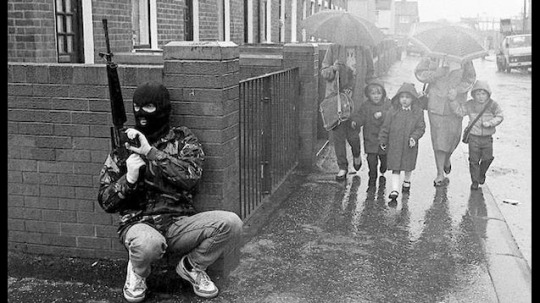

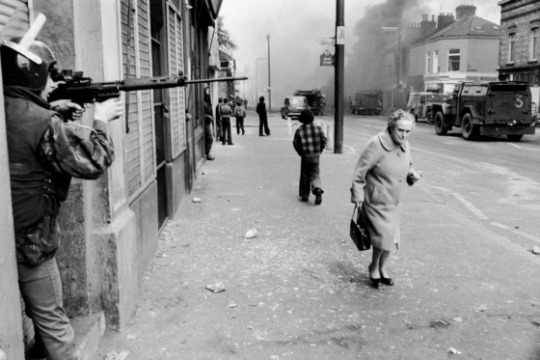
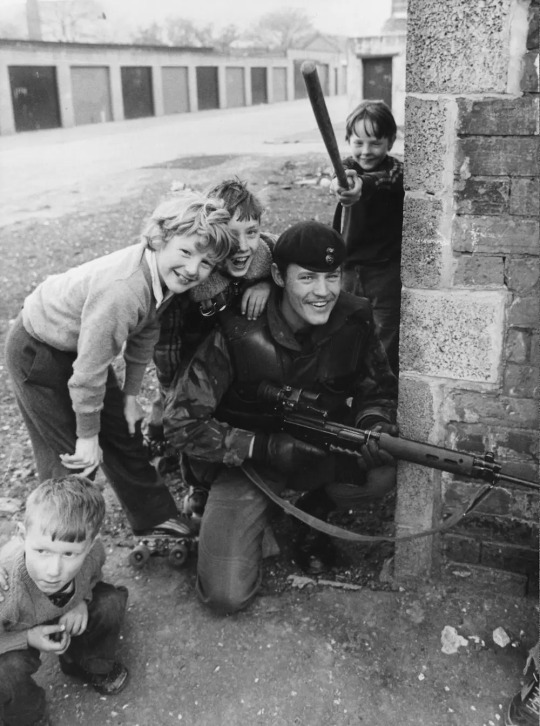
Perhaps one of the best parallels would be life in Palestine, particularly the Gaza Strip. The Gaza Strip, with a population of >2 million has lived under blockade for many years with frequent intervention/incursion by Israel.

[Aftermath of Israeli strikes in Gaza City, 2021]
One of the interesting parallels with Palestine is the plethora of different actors and resistance groups, just a fractious and secretive as New Rho's Blood of Eden and other militants, and who often seem to spend more time fighting themselves and civilians rather than their main enemy.
The Marxist-Leninist Popular Front for the Liberation of Palestine (PFLP) gave us the splinter groups PFLP-SC (Special Command), PFLP-GC (General Command), PFLP-EO (Executive Order), Palestinian Popular Struggle Front, Democratic Front for the Liberation of Palestine, Popular Revolutionary Front for the Liberation of Palestine, and had complex intertwined relations with groups like the Black September Organisation, Palestinian Liberation Front, Arab Liberation Front, Palestinian National Salvation Front, the Abdul Nidal Organisation, Fatah al-Intifada, Vanguard for the Popular Liberation War - Lightning Forces, and dozens of others. On the Islamist side there is similarly a plethora of groups, from Hamas, to Palestinian Islamic Jihad, Sheikh Omar Hadid Brigade (Islamic State in Gaza), the al-Aqsa Martyrs' Brigade, the Army of Islam, and Jund Ansar Allah. It's almost comical to write them out.
New Rho itself is home to many refugees and "re-settled" peoples, which is somewhat reminiscent of Palestinians and the related conflict spilling into Lebanon, Jordan and other neighbouring areas. The complexity and number of groups involved skyrocket.
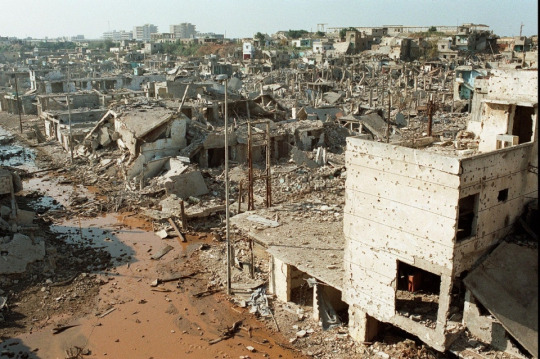
[Shatila Camp, Lebanon during the War of the Camps]
Rarely is war as simple as "Good Guys vs. Bad Guys" or even "Bad Guys vs. Bad Guys." There is almost always a vast number of interest groups and competing organisations at stake, even in some of the more black and white wars like WW2. Muir just hits this nail right on the head in my opinion.
You could also make similar parallels to the Syrian Civil War, which has an equally complex mix of militants and groups. Despite all of that, of course, life still goes on. School kids still attend school, even in bullet ridden buildings.


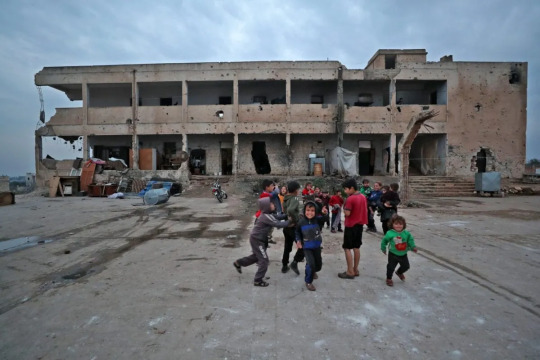
These kids are your Hot Sauce and Honesty and Kevin and Beautiful Ruby.
Typically the books I've read depicting a place under siege or at war (at least in sci-fi / fantasy) have a focus on the main characters leading the war effort. There may be issues of water or food shortages, but they're largely somewhat abstract political complications being dealt with by key rulers or the like. Often times war is simply sanitised completely (think Star Wars), or it is portrayed through a military lens, or when it deals with civilians it focuses on the destruction and death of civilian life.
I just found Nona wonderful in depicting the mundanity, the boredom, the regularity of life in a war zone, as well as the sudden shocks of change and turmoil and fear, and then as well the glimpses of joy and pleasure that humans still experience. I'm just really quite blown away by Tamsin Muir, and I wonder if she had a specific conflict as inspiration for her writing here.
31 notes
·
View notes
Text
obviously i am all for support for palestine in any mean necessary...
But i will never understand why lebanon has to interfere militarily. By lebanon I mean Hezbulla obvs since our army is for shits and giggles. So, why? All you do is rile those fuckers up with your tiny missiles that put a dent on their stolen land and then they retaliate 100x over and start another war. In what world does a bite sized country like HA lebanon think it can take on an army backed by several other countries that can literally blow us out of the planet in a second?
and i knooooow this is way more politically complicated than i'm making it sound but come one just let us breathe ffs. The civillians who are still struggling with the world's worst economic crisis, barely able to find medication, dealing with frequent power outages...they have no brain capacity for a war right now. And the funny thing is, no one living here is even worried about the war, they're so drained from the other shit that they're numb to it at this point. I swear i have people outside worried about me and like...no one is freaking out about it here. It's just another piece of news. Oh the airport might shut down? Oh well. We have to move north to avoid air strike? Better fill up gas.
#i swear no one hates israel more than me but i don't want this#je suis fatigue#let's watch some LOUIS!!!
2 notes
·
View notes
Text
The Ottoman Empire was a major world power that emerged in the 13th century and reached its height of influence in the 16th and 17th centuries. It was a multi-ethnic and multi-religious empire that spanned three continents, and was known for its military might, cultural achievements, and political and economic power.
The Ottoman Empire was founded by the Ottoman Turks, a nomadic tribe that migrated to Anatolia (present-day Turkey) in the late 13th century. Under the leadership of Osman I, the Ottoman Turks established a small state in Anatolia and began to expand their territory through military conquests.
Over the next several centuries, the Ottoman Empire continued to grow and expand, eventually becoming a major world power. It conquered a large portion of southeastern Europe, including the Balkans and parts of Hungary, and extended its control into the Middle East, North Africa, and the Caucasus.
The Ottoman Empire was known for its strong and centralized government, as well as its sophisticated bureaucracy and legal system. It was also a major cultural center, with a diverse population that included Muslims, Christians, and Jews. The Ottoman Empire was home to many intellectuals, artists, and scholars, and it made significant contributions to fields such as literature, art, and science.
However, despite its strength and influence, the Ottoman Empire began to decline in the 18th and 19th centuries. A number of factors contributed to its decline, including military defeats, economic problems, and internal conflicts.
One of the major factors that contributed to the decline of the Ottoman Empire was the rise of European powers, which began to challenge its dominance in the 19th century. The Ottoman Empire lost a number of wars to European powers, and was forced to give up territory and power.
The Ottoman Empire also faced economic problems, including a decline in trade and revenue, as well as a rising national debt. These problems were compounded by a series of internal conflicts, including revolts and uprisings, as well as power struggles within the Ottoman government.

The decline of the Ottoman Empire was a slow and gradual process, and it was not until the early 20th century that the empire finally collapsed. In the aftermath of World War I, the Ottoman Empire was dissolved and its territory was divided among European powers.
Today, the legacy of the Ottoman Empire can still be seen in the countries that were once part of the empire, including Turkey, Jordan, Lebanon, and Iraq. Its cultural and political influence has had a lasting impact on the region, and it remains a significant part of the history and identity of the Middle East and Southeast Europe.

8 notes
·
View notes
Text
Twelve years after the 2011 uprisings and subsequent civil war began, Syrian President Bashar al-Assad has kept his hold on power through a strategy of civilian targeting, siege tactics, and countless other war crimes. At least 350,000 civilians have been killed and the majority of the country’s population has been displaced, including over 6.8 million as refugees. Yet even as refugees have built new lives abroad, most Syrians in Turkey, Lebanon, and Jordan — the main regional hosting countries — are economically and sociopolitically marginalized to different degrees. The poverty rate for refugees in the region is over 70% and is being aggravated by worsening domestic economic crises. Politicization of the refugee presence in each country has left many Syrians with tenuous legal statuses and prevented permanent integration. Efforts by the Assad regime to normalize regional diplomatic relations — accelerated after the devastating February 6 Turkey-Syria earthquakes — are raising fears of mass forced refugee returns.
In Lebanon and Turkey, in particular, Syrians face both increasingly hostile government policies and growing anti-refugee public opinion. Turkey’s opposition parties have long made sending back Syrian refugees a key component of their agendas and are stoking popular anti-Syrian sentiment ahead of the May 14 presidential election. President Recep Tayyip Erdoğan has discarded his government’s formerly friendly rhetoric, vowing in 2022 to send back one million refugees to northern Syria. In Lebanon, Syrians have faced a rise in arbitrary deportations — including raids last month by the Lebanese army.
But even facing increased discrimination, more than 70% of Syrian refugees do not intend to return to Syria within the next five years — for the main reason that many cannot safely return home. As Syrian displacement stretches into its thirteenth year, donors, host countries, and civil society organizations need to think creatively to avoid the long-term human, development, and security consequences of marginalizing Syrian refugees in the Middle East.
Current policies toward Syrians
At the start of the civil war, neighboring countries opened their doors to Syrians fleeing increased violence. Local communities, international actors, and host governments navigated meeting the needs of the millions of newly displaced and expanding public services. While Lebanon’s government has been relatively hostile toward Syrians since the start, Turkey and Jordan implemented initiatives to enable refugee labor market participation and expand services, and Turkey granted citizenship to over 200,000 refugees. Today, however, Syria’s neighbors have sharply different policies and rhetoric toward refugees. The common factor is that refugees’ economic and sociopolitical situation is worsening, not improving.
The policy environment for refugees in Jordan has been comparatively more welcoming, due in part to the country’s strong Western ties. Jordan has enacted long-term programs such as the 2016 Jordan Compact that provide work permits and expanded access to education for the more than 660,000 registered Syrian refugees in exchange for international support and economic concessions for Jordanian companies. However, Syrians in Jordan are restricted to specific occupations, and the Jordan Compact struggled to deliver on work permit targets and private sector growth. Policies on access to services such as healthcare have fluctuated, and aid has not translated into economic inclusion — over 80% of Jordan’s Syrian refugees outside of refugee camps fall below the poverty line.
Lebanon’s politicians have increasingly scapegoated the country’s over 800,000 refugees for the consequences of their own political gridlock and corruption. The government has repeatedly sought to mass repatriate Syrians — held back primarily by international pressure — and refugees face arbitrary deportations and deep socioeconomic exclusion. With the economy in free fall since 2019, 9 out of 10 Syrian refugees are impoverished, along with rapidly increasing poverty among Lebanese citizens. Some refugees have turned to TikTok for donations, facilitated by exploitative businessmen.
Finally, Turkey shelters over 3.4 million registered Syrian refugees and is the world’s largest refugee-hosting country. Erdoğan’s government initially welcomed refugees, providing free access to healthcare and education, though it enacted mobility restrictions that limit refugees to their province of registration. However, anti-refugee popular sentiment and political rhetoric against Syrians have gotten increasingly worse. The pandemic and broader economic crisis facing Turkey have pushed more refugees into poverty.
The earthquakes and Turkish elections have further complicated the future of Syrian refugees in Turkey and across the region. After the earthquakes, anti-refugee sentiment in Turkey manifested in a flood of social media rumors that Syrians were looting aid, leading to increased social tensions and discrimination against Syrians by government authorities.
The Assad regime has also utilized the earthquakes to broaden its normalization campaign with countries across the region. Both the Turkish government and opposition have emphasized normalization and mass refugee return during election campaigning, though Turkey’s control of parts of northern Syria and rebel support have stymied normalization efforts.
However, as polling of Syrians indicates, normalization will likely not translate into large-scale voluntary return given Syria’s ongoing violence, repression, and economic crisis. Jordan has progressively reengaged Syria since 2017, but few refugees have actually returned because of persistent insecurity. The Syrian government itself has appeared unwilling to accept refugees posing possible threats to its authority. Furthermore, while deportations are increasing across the region, mass forced return would violate international law and cause more Syrians to attempt to reach Europe — something that Europe and the United States do not want.
Instead, Syrians have become a semi-permanent economic, social, and political underclass in their hosting countries, unable to go home and met with increased exclusion in their displacement. This approach has dire human consequences — for the generation of refugee children with limited access to school, and for the mental health and economic futures of both Syrian families and their poorly supported host communities. The stability and security consequences will also be significant, particularly if Western countries focus primarily on border enforcement to prevent migration instead of supporting refugees and hosting countries.
Policy Solutions
The current strategy demands a serious rethink. First, a full transition to long-term approaches in aid and economic support of refugee-hosting countries is necessary. While stakeholders have called for development-oriented programming, particularly in protracted refugee situations, too often aid programs are reliant on short-term funding cycles implemented by international NGOs outside of host country systems.
Facilitating overall economic growth and both host community and refugee labor participation is also crucial. Building on the Jordan Compact, Brookings expert Kemal Kirişci has argued for a Turkey Compact to ensure refugees are included in reconstruction. He outlines an approach whereby trade concessions would be extended to Turkey by Western countries to incentivize business growth and job creation, particularly in sectors with high levels of refugee employment. Such models require learning from the mistakes of the Jordan Compact in excluding refugees and input from private sector stakeholders.
Second, there needs to be more engagement of local officials and civil society organizations who are the most equipped to support refugees in their communities. Municipal officials in Turkey, Lebanon, and Jordan are frontline actors and key to facilitating refugee inclusion locally, yet refugee response funding is often highly nationalized. Organizations have put forward concrete policy actions donors and host states can take to build on local capacity to mitigate tensions.
Third, the international community must fulfill the promises made of safe resettlement pathways for refugees as well as expand labor migration pathways. In 2021, only approximately 17,000 Syrians were resettled. Instead, more Syrians are taking dangerous smuggling routes. In 2022, asylum applications in the European Union from Syrians were the highest since 2016. Increasing resettlement for Syrians is also crucial as a signal that developed countries are willing to share responsibility in welcoming refugees. This increase is achievable — in the earthquakes’ aftermath, Spain offered expedited resettlement for refugees in the disaster zones, and the United States is ramping up resettlement after years of low admissions.
Matching refugees to labor needs and providing skills training could also help refugees access a wider range of labor visas in the Gulf and elsewhere. In the aftermath of the 1948 and 1967 Arab-Israeli wars, many Palestinian refugees in neighboring countries were able to work in the Gulf states. Palestinian refugees provided remittances for their families in Jordan, for example, and directly supported its economy. However, as the expulsion of hundreds of thousands of Palestinians following the 1990-91 Gulf War demonstrated, these visas often do not offer the long-term legal protection of refugee status.
Finally, vastly increased effort is needed to improve the economic, housing, and security situation in northern Syria for those refugees who do wish to return. Over 1.7 million individuals in northwestern Syria lived in camps before the earthquakes, and the destruction worsened an already-dire housing situation. Experts argued even prior to the earthquake that a reconstruction and development-centered approach needed to be adopted in northern Syria.
In 2019, 78% of refugees were displaced for longer than five years. Refugees become long-term members of communities whether they are met with supportive policies or not. Research shows that refugees contribute to local economies and attract international support for local development. However, without adequate support and socioeconomic inclusion, refugees can strain local economies and public service systems. Without a new approach, Syrian refugees and host communities in the Middle East face a grim future.
2 notes
·
View notes
Note
Hi, I’m a learning radical feminist from Lebanon. I was born Druze so it’s nice to see another minority from the Middle East run a feminist blog unapologetically! I just wanted to say I really appreciate your blog, it’s really reassuring and inspiring to read you. Sorry for being on anon. Have a nice day or night, whenever you see this. ❤️
omgg i think ur the first druze to msg me actually!! nice to hear from you anon. i hope you're dealing well with the struggles going on in lebanon rn, ive heard from lebanese friends that its a total mess rn especially economically.
thank you for your sweet words & no need to apologise for being anon <3 ik some people are shy or nervous or paranoid nd i get it. always great to hear from other minorities from the MENA region, no matter how.
#BTW u should check out sex & love around the world's episode on beirut#personally was shocked by it bc i definitely expected beirut to be way more open-minded than it is but i think khaleejis generally imagine#the rest of MENA as like religiousless when no
2 notes
·
View notes
Text
Abortion access is only one issue impacting women that we need to raise awareness about
KEY POINTS
As food insecurity becomes an increasingly global concern, a new report suggests that of the 828 million people affected by hunger in 2021, two-thirds were women.
The gap between men’s and women’s food security has grown 8.4 times since 2018. With the onset of Russia’s war in Ukraine, the situation looks set to deteriorate further.
“Everything that we’re seeing is telling us that it’s going to get worse,” Emily Janoch, Care’s senior director of thought leadership, told CNBC.
For 33-year-old Rouaya raising five children in a small village in Akkar, north Lebanon, times are hard.
Following the dual crises of the Covid-19 pandemic and Lebanon’s economic collapse, she has had to double her workload, “working in the fields and in the house.” But still, she struggles to earn enough money to eat. Russia’s invasion of Ukraine and its impact on food supplies has only made matters worse.
“Often I don’t have enough money to purchase food to cook, so I give the children bread sprinkled with thyme. Sometimes, too, we only eat twice a day. Times have never been so bad,” she said.
Rouaya is not alone. She is one of tens of millions of women worldwide who find themselves eating last and eating least as a worsening food crisis exacerbates existing gender inequality issues.
A growing gender disparity in food access
Of the estimated 828 million people globally who were affected by hunger in 2021, around three-in-five (59%) were women, according to a report released earlier this month by humanitarian organization Care.
That’s equivalent to 150 million more women facing food insecurity than men.
And the gap is widening.
Since 2018, the disparity between men’s and women’s food security has grown 8.4 times, accelerated in part by the coronavirus pandemic. Now, with the onset of Russia’s war in Ukraine and accompanying food shortages, alongside wider inflationary factors, the situation looks set to deteriorate further.
The implications are astronomical ... we know they’re going to fall heavily on women and girls.
Emily Janoch
SENIOR DIRECTOR OF THOUGHT LEADERSHIP AT CARE
“Not only is that a stark gap, it is a gap compared to 2018 that is growing rapidly,” Emily Janoch, Care’s senior director of thought leadership and one of the report’s authors told CNBC.
The findings, which draw on data from the United Nations and World Bank, report the state of play up to Dec. 2021. The fallout from the crises of 2022 will not be known until next year, but the forecast looks bleak.
“Everything that we’re seeing is telling us that it’s going to get worse,” Janoch said.
“If you look at the impact on agriculture following the Russian fertilizer crisis, the implications are astronomical. We don’t know exactly what they will look like, but we know they’re going to fall heavily on women and girls,” she said.
Food insecurity rises as gender equality falls
According to the U.N.‘s 2022 ‘The state of food security and nutrition in the world’ report, women have poorer food security than men in every region in the world. That disparity is especially pronounced in developing countries and specifically in the Global South.
Care’s report also found that as gender inequality increased across 109 countries, so too did food insecurity. In Sudan, for instance — which the World Bank scored a 2.5 out of 6 for gender equality —almost two-thirds of women (65%) reported being food insecure versus nearly half (49%) of men.
That as girls and women are responsible for 85-90% of household food preparation globally and most food shopping, according to the U.N.’s Food and Agriculture Organization.
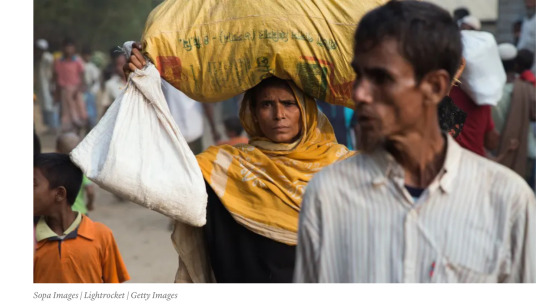
“Women are very heavily socialized to pull that burden on themselves. And everyone around them is socialized to assume that they will,” Janoch said.
Indeed, even when both men and women are technically food insecure, women still tend to bear the bigger burden.
In Somalia, for example, men reported eating smaller meals while women reported skipping meals altogether.
In Lebanon, at the start of the Covid-19 pandemic, 85% of people reported reducing the number of meals they ate, but more women (85%) than men (57%) reported eating smaller portions too.
Meantime, in Bangladesh, one in five (21%) women reported experiencing increased violence at home as a result of higher food prices.
‘A dollar in the hands of a woman’
Such gendered food security gaps have major implications not only for women and the families for whom they may be responsible but also for the wider economy.
Often, large portions of women’s economic contributions go unrecognized or are hard to calculate — at least in economic data. Indeed, the IMF estimates that the economic value of unpaid work, which it says is mostly done by women, accounts for between 10% and 60% of gross domestic product.
Rebecca Burgess, country director at The Hunger Project U.K., said that further enabling women’s economic participation and decision-making — both at a household and legislative level — would go a long way to reducing poverty and improving nutritional outcomes across the board.
[Women] routinely invest significant portions of their income in food, health care and education for their families.
Rebecca Burgess
COUNTRY DIRECTOR AT THE HUNGER PROJECT U.K.
“A proven way to overcome many systematic barriers to a woman’s success has been increased participation by women in local, regional and national legislation as empowered change agents,” Burgess told CNBC.
“Time and time again studies have demonstrated that when women are given the opportunity to generate and control an income, they routinely invest significant portions of their income in food, health care and education for their families,” she said.
Indeed, a 2021 Care study from Burundi found that investing in gender equality in agriculture brought a $5 return for every $1 invested, compared to a $2 return for every $1 invested in agriculture programs that ignored gender equality.
“Women are huge players in economic supply chains that are not always seen,” Janoch said. “A dollar in the hands of a woman goes further to increase food security.”
5 notes
·
View notes
Text
"The rift between the modern and the conservative displaces the struggle against imperialism into a struggle over fashion and personal persuasions. This is an important task for imperialism: it wants to weaken Lebanon without appearing it did so, and for this, it is aided and abetted by an army of NGOs whose role is mightier than the F35s of the US air force. These are the institutions that voice freedom while they instrumentalize the neoliberal socio-economic policies, which leave the masses without any essentials to exercise any degree of freedom. To illustrate: NGOs’ emphasis on the corruption of the Lebanese class, as opposed to the reigning US-neoliberal ideas espoused by the Lebanese masses, shows how useful they are in obfuscating the true causes of the crisis.
...
The US has hit two birds with one stone, it crippled Lebanon and drained all the US-opposed international parties that parked their assets in Lebanese banks. A story as obvious as this is not even entertained by the US-sponsored NGOs. History is personalized like a cartoon spectacle with this or that guy being bad as opposed to the terrible ideological or class context in which things evolve. "
4 notes
·
View notes
Text
abc news

##https://daizygedeon.com/##
##https://daizygedeon.com/##
Middle East news
Welcome to the hub of all things Middle East news! From the latest updates in Lebanon and Beirut to the ongoing Israel-Hamas war, we've got you covered with what's happening now in this dynamic region. Get ready to dive into the top sources like Al Jazeera, ABC News, and BBC News for today's most pressing headlines. Stay tuned as we unravel the Trump news, Hamas war updates, and much more right here on your go-to platform for all things Middle East news. Let's get started!
Lebanon news
Lebanon, a country known for its rich history and vibrant culture, has been making headlines recently. The political situation in Lebanon remains tense as the government grapples with economic challenges and social unrest. Citizens have taken to the streets to protest corruption and demand change, adding another layer of complexity to an already delicate situation.
The devastating explosion in Beirut last year continues to impact the country, with reconstruction efforts ongoing amidst widespread devastation. The Lebanese people have shown resilience in the face of adversity, coming together to support one another during these challenging times.
As Lebanon navigates through these turbulent waters, all eyes remain on this small but significant nation in the Middle East. Stay tuned for more updates on Lebanon news as events continue to unfold.
Beirut news
Beirut, the vibrant capital of Lebanon, has been making headlines recently for various reasons. From political unrest and economic challenges to the devastating explosion that rocked the city in August 2020, Beirut has been at the center of attention globally. The aftermath of the explosion left a trail of destruction, with many still struggling to rebuild their lives and businesses.
Despite the hardships faced by its residents, Beirut continues to showcase resilience and hope as it slowly starts to recover from the tragedy. The city's rich history and cultural diversity remain integral parts of its identity, attracting visitors from around the world who are eager to explore its charm.
As Beirut navigates through these turbulent times, it serves as a symbol of strength and perseverance for not only Lebanon but also for other cities facing adversity. Keeping an eye on developments in Beirut is crucial for understanding the complexities of the Middle East region as a whole.
happening now in Middle East
As we turn our attention to the Middle East, a region rich in history and culture, there is always something happening that captures the world's interest. From political developments to social movements, the Middle East continues to be a focal point of global news.
In recent days, tensions have been escalating in various parts of the region, with conflicts flaring up and diplomatic efforts underway to find peaceful resolutions. The dynamic nature of the Middle East ensures that there is never a dull moment when it comes to current events.
With countries like Lebanon facing economic challenges and ongoing protests in Beirut demanding change, it is essential to stay informed about what is unfolding in this complex and intriguing part of the world. Keeping up with the latest developments can provide valuable insights into the diverse issues at play in the Middle East today.
Whether it's updates on regional conflicts or advancements in peace talks, staying informed about what is happening now in the Middle East allows us to better understand this ever-evolving landscape.
best news source
Looking for the best news source to stay updated on Middle East happenings? Look no further than Al Jazeera. With its comprehensive coverage and in-depth analysis, Al Jazeera is a go-to platform for all things related to the region.
Whether you're interested in Lebanon news, Beirut headlines, or updates on the Israel-Hamas war, Al Jazeera has got you covered. Their online platform provides real-time updates and breaking news alerts so you never miss a beat.
For those who prefer watching the news live, Al Jazeera offers a live stream option that allows viewers to tune in and follow developments as they unfold. Stay informed with their latest news segment covering everything from politics to human interest stories.
Don't rely on just one source for your news needs - explore different perspectives and viewpoints by checking out reputable sources like ABC News or BBC News alongside Al Jazeera. Keeping an open mind and staying well-informed is key when it comes to understanding complex issues affecting the Middle East.
aljazeera online
Al Jazeera Online is a go-to source for up-to-the-minute news and updates from the Middle East. With its vast network of reporters across the region, Al Jazeera provides comprehensive coverage on a wide range of topics including politics, conflict, culture, and more.
Whether you're interested in Lebanon news or developments in the Israel-Hamas war, Al Jazeera has you covered with detailed analysis and insightful reporting. The platform offers a mix of articles, videos, and live streams to keep you informed on what's happening now in the Middle East.
From Beirut news to Trump updates, Al Jazeera delivers breaking stories as they unfold. Its user-friendly website makes it easy to navigate through different sections and find the information you're looking for quickly.
For those who prefer watching news live, Al Jazeera also offers a streaming service where you can tune in to real-time coverage of events as they happen. Stay informed with Al Jazeera Online's latest news updates on all things Middle East-related!
aljazeera live
Al Jazeera Live is a go-to source for up-to-the-minute news coverage in the Middle East and around the world. With its live streaming service, you can stay informed on breaking developments as they unfold. Whether it's political upheaval, humanitarian crises, or environmental events, Al Jazeera Live provides real-time updates to keep you in the loop.
Tune in to Al Jazeera Live for comprehensive reporting from seasoned journalists who are dedicated to delivering accurate and reliable information. The platform covers a wide range of topics including politics, economics, culture, and more. By watching Al Jazeera Live, you can gain valuable insights into global affairs and better understand the complexities of our interconnected world.
Stay connected with Al Jazeera Live's user-friendly interface that allows viewers to navigate effortlessly through different news segments. From interviews with experts to on-the-ground reporting from correspondents worldwide, Al Jazeera Live offers a diverse array of perspectives on current events. Trustworthy and dynamic, Al Jazeera Live is your window to the ever-evolving landscape of international news.
aljazeera news latest news
If you're looking for the latest news from the Middle East, Al Jazeera is a go-to source. Providing up-to-the-minute updates on Lebanon, Beirut, and beyond, Al Jazeera covers a wide range of topics with in-depth analysis. Whether it's political developments, social issues, or cultural events, you can count on Al Jazeera to keep you informed.
With their online platform and live broadcasts, accessing breaking news has never been easier. Stay updated on what's happening now in the region with just a click of a button. From Trump news to Israel-Hamas war updates, Al Jazeera delivers comprehensive coverage that keeps you in the know.
When it comes to staying informed about Hamas war news or Israel-Hamas war developments, Al Jazeera offers detailed insights and reports. Their team of journalists works tirelessly to bring viewers accurate and timely information regarding these critical issues affecting the Middle East.
For those seeking reliable and trustworthy reporting on current events in the region, turn to Al Jazeera for your daily dose of Middle East news.
todays news
Today's news is buzzing with updates from the Middle East, particularly focusing on Lebanon and Beirut. The region continues to be a hotspot for political tensions and conflicts, making headlines across various news sources.
Al Jazeera online provides real-time coverage of the latest developments in the Middle East, offering a comprehensive view of what's happening on the ground. With Al Jazeera live streaming available, viewers can stay informed about breaking news as it unfolds.
In addition to regional updates, today's news also features ongoing discussions about Trump's policies and their impact on the Middle East. This adds another layer of complexity to an already volatile situation in the region.
As we navigate through today's news cycle, it becomes evident that staying informed about the Israel-Hamas war is crucial. Updates on this conflict play a significant role in shaping geopolitical dynamics in the Middle East.
Stay tuned to reputable sources like ABC News and BBC News for reliable coverage of current events in the Middle East. Keeping up with these updates ensures a well-rounded understanding of complex issues affecting the region.
trump news
Have you heard the latest updates on Trump in the Middle East news? It seems like his actions and statements always manage to stir up controversy and debate. Love him or hate him, there's no denying that he always finds a way to make headlines around the world.
From his policies on Iran to his stance on Israel, Trump's decisions have had far-reaching implications in the region. Whether it's negotiating peace deals or imposing sanctions, his influence is undeniable.
With tensions running high in the Middle East, every move by Trump is closely watched and analyzed. Even after leaving office, his impact continues to be felt across borders and boundaries.
Love him or hate him, one thing is for sure - when it comes to Trump news in the Middle East, there's never a dull moment.
Israel-hamas war updates
The Israel-Hamas conflict continues to escalate, with both sides exchanging airstrikes and rocket fire. The situation remains volatile as casualties mount on both sides, including civilians caught in the crossfire.
Amidst international calls for de-escalation, tensions remain high as Hamas vows to continue its attacks on Israeli territories. The Israeli military retaliates with targeted strikes against Hamas strongholds and infrastructure.
As the conflict unfolds, global leaders are closely monitoring the situation, urging for a ceasefire to prevent further loss of life. The United Nations has expressed deep concern over the escalating violence and called for immediate dialogue between the warring parties.
The impact of the Israel-Hamas war extends beyond just physical destruction; it also fuels existing political tensions in the region. As efforts are made to broker peace talks, uncertainty looms over whether a lasting resolution can be achieved in this long-standing conflict.
Israel-hamas war news
The ongoing Israel-Hamas war has been a focal point of the Middle East news, with tensions escalating and impacting the region. The conflict has resulted in devastating consequences for civilians on both sides, leading to widespread destruction and loss of life.
As the situation continues to unfold, global attention remains focused on efforts towards de-escalation and finding a peaceful resolution to the conflict. Both Israel and Hamas have faced criticism for their actions during this crisis, with calls for an immediate ceasefire growing louder.
The international community plays a crucial role Israel-hamas war updates in mediating discussions between the warring parties, aiming to bring about stability and prevent further escalation of violence. The impact of this conflict extends beyond regional borders, highlighting the need for diplomatic solutions that prioritize peace and security for all involved.
can
In the fast-paced world of Middle East news, staying informed is crucial. One question that often arises is: Can we trust the sources we turn to for updates on Lebanon and Beirut news? With conflicting reports and varying perspectives, it's essential to be discerning when consuming information.
Al Jazeera Online has emerged as a reliable platform for the latest news in the region. Whether you prefer reading articles or watching Al Jazeera Live, their coverage of current events is extensive and insightful. From Trump news to Israel-Hamas war updates, they provide a comprehensive view of what's happening now in the Middle East.
For those seeking diverse viewpoints, ABC News and BBC News offer valuable insights into Hamas war news and Israel news. By exploring multiple sources, you can gain a more nuanced understanding of complex issues shaping the region. Stay curious and engaged with reputable outlets to navigate through the constantly evolving landscape of Middle East news effectively.
abc news
When it comes to staying informed about the latest events in the Middle East, ABC News is a reliable source that many turn to for accurate and up-to-date information. With their extensive coverage and experienced journalists, ABC News provides viewers with comprehensive reports on various topics ranging from politics to culture.
ABC News brings a fresh perspective to news stories in the region, shedding light on important issues that impact people's lives. Whether it's breaking news or in-depth analysis, ABC News delivers content that keeps audiences engaged and well-informed.
With a focus on delivering unbiased reporting, ABC News strives to present all sides of a story, allowing viewers to form their own opinions based on facts. This commitment to journalistic integrity sets ABC News apart as a trusted source for those seeking reliable news coverage.
In an ever-changing world where information is key, ABC News continues to be a go-to destination for individuals looking for quality journalism and insightful reporting. Stay tuned to ABC News for the latest updates on Middle East news and beyond.
bbc news
BBC News is a trusted source for up-to-date information on global events, including those unfolding in the Middle East. With its reputation for accuracy and impartial reporting, BBC News delivers comprehensive coverage of news stories from around the world.
Whether you're interested in political developments, cultural trends, or breaking news updates, BBC News provides a diverse range of topics to keep you informed. From insightful analysis pieces to live updates on major events, their platform offers something for every kind of news consumer.
By tuning into BBC News regularly, you can stay informed about the latest happenings in the Middle East and beyond. Their team of experienced journalists works tirelessly to bring you reliable news that matters most. So next time you're looking for a credible source of information, consider turning to BBC News for your daily dose of current affairs.
Hamas war news
The ongoing conflict between Israel and Hamas continues to captivate the world's attention. Recent developments have seen escalating violence and casualties on both sides, drawing concerns from global leaders.
Hamas, the militant group in control of the Gaza Strip, has been launching rockets into Israeli territory, prompting retaliatory airstrikes from the Israeli military. The cycle of attacks and counterattacks has resulted in significant civilian casualties and widespread destruction.
The international community is calling for an immediate ceasefire to prevent further loss of life and alleviate humanitarian suffering. Efforts are being made to broker a truce between the two parties, but reaching a lasting peace agreement remains elusive amidst deep-rooted tensions and grievances.
As news outlets provide real-time updates on this volatile situation, people around the world are closely following developments in hopes for a peaceful resolution to this longstanding conflict.
Israel news
For the latest updates on Israel news, stay informed through reputable sources like Al Jazeera, ABC News, BBC News, and other trusted news outlets. The ongoing developments in the Middle East are crucial to understanding the complex dynamics of the region. Keep yourself updated with accurate information from reliable sources to have a comprehensive view of what is happening in Israel and beyond. Stay engaged and informed about current events shaping the Middle East landscape.
#Middle East news#Lebanon news#Beirut news#happening now in Middle East#best news source#aljazeera online#aljazeera live#aljazeera news latest news#todays news#trump news#Israel-hamas war updates#Israel-hamas war news#can#abc news#bbc news#Hamas war news#Israel news
0 notes
Text
As Sheila Ryan writes, from 1948 until mid-1973 “Israel had received the staggering sum of over $8 billion in economic assistance from various foreign sources, or $3,500 total for each Israeli – an average of $233 per year per capita in aid. Thus, an average Israeli each year received in aid alone more than double the per capita income of an Egyptian ($102 in 1969).” Between 1943 and 2023, the US has provided Israel with $160 billion in aid (with inflation adjusted reaching about $260 billion), without considering the regular loan guarantees extended to the entity that are worth billions. This aid to Israel is an investment in militarism for US-led imperialism. The peculiarity of the Zionist entity lies in it being a settler-colonial formation, as much as the US, incubating a mode of consciousness that promotes imperialist values and secures US hegemonic domination in the region. By acquiring nuclear weapons and through its numerous military attacks on and invasions of other countries of the region – i.e., such as Iraq, Lebanon, Syria, Israel has been the major force behind imperialist capital accumulation and its corollary, Arab de-development. As the Palestinian leftist circles in the 1960s-70s consistently emphasised, Zionism is the spearhead of imperialism in the region. As much as the liberation of Palestine is a struggle against US-led imperialism on whose behalf Israel acts as a gendarme, an attack on Israel is an attempt to undermine directly the core interests of the US and its reactionary allies in the region.
As per the oil-rich Gulf monarchies, the control of the ruling classes of these political formations guaranteed the supremacy of the US dollar at the international level through dollar-denominated oil sales, which were then being recycled in the purchase of US treasury bonds and weaponry. In recent years, following the various attacks on the sovereignty of secular Arab republics (Iraq, Libya, and Syria), coordinated with the money and weapons of the Gulf countries, the US has also pushed an agenda of normalisation with Israel. The more Israel is recognised officially in the region, the more secure the interests of US-led imperialism are.
106 notes
·
View notes
Text
Anti-China Narrative Psychological Projection of US
— By S.L. Kanthan | February 08, 2024
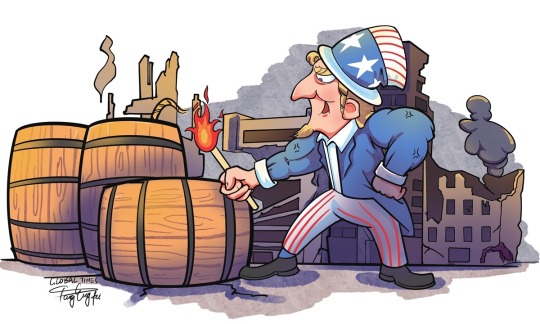
Illustration: Tang Tengfei/Global Times
The US has struggled with a congenital defect - its addiction to wars. President John Quincy Adams famously said, "America does not go abroad in search of monsters to destroy." However, history tells a very different story, with the US having spent about 94 percent of the time in wars since 1776. The American Empire now has 800 military bases in 140 countries, and keeps doubling down on perpetual wars. Not satisfied with the current proxy and real wars in Ukraine, Gaza, Yemen, Lebanon, Iraq, Syria - and possibly Iran soon - the cackle of American think tanks and corporate media is clamoring for a delusional hot war against China.
The narrative against China can only be described as psychological projection. Using twisted logic and fallacies, the China hawks scream that China is a threat to the US and the world. But they forget to mention that the US has been waging non-stop economic war and propaganda war against China for years. Also, it is the US that surrounds China with hostile military bases - building new ones in the Philippines. Yet, in the world of inversion, China is the bad guy.
The US tries to hobble China's economy in countless ways, and then claims that China's slower GDP growth - relative to China's past performance, but still much better than the G7 nations - is an indication of China's intent to "invade Taiwan."
From Monday through Wednesday, US media gloats that China is collapsing. And Thursday through Sunday, the same media cries that China is on the cusp of taking over the world. Which one is it - China is weak or omnipotent?
Another popular talking point among anti-China hardliners is the rapid growth in China's defense investment. China's military strategy is mostly defensive like the Great Wall. China is a "threat" only to rapacious invaders.
As for Taiwan, here is the bitter pill for imperialists: there will be reunification. When China was weak in the 19th century, it was attacked by vultures who plucked off strategic regions. However, as China regained its rightful position in the world, former colonialists retreated, giving back the stolen lands. Remember how Portugal returned Macau and the UK returned Hong Kong? Similarly, the US will one day let go of Taiwan. The sooner the Americans accept this inevitability, the better the world will be.
"America Does Not Go Abroad in Search of Monsters To Destroy." — President John Quincy Adams
There was a time when one could tell the difference between a sensational tabloid and serious journalism in the US, but not anymore. Now, the once respectable media outlets such as the New York Times and Wall Street Journal are filled with fake news, disinformation and war propaganda.
A recent article by Hal Brands in Foreign Policy is an exemplary case for this decline in American intellectualism. By the way, Mr. Brands has stellar credentials - educated at Stanford and Yale, author of numerous books, and a regular columnist. However, his article is filled with misinformation and sensationalism. Lacking any real evidence of "China threat," he quotes the CIA, the organization that lies, cheats and steals - to paraphrase Mike Pompeo, former CIA director.
Finally, Hal Brands' entire premise about the state of China's economy is deeply flawed. In his echo chamber, nobody talks about China's 5.2-percent GDP growth in 2023, a trade surplus of a staggering $800 billion, China becoming the world's #1 exporter of cars, BYD surpassing Tesla, the resurgence of Huawei, and a long list of other accomplishments.
China watchers have been wrong for long but nobody gets fired for being wrong about China. Why? The goals of incessant big lies are to convince Americans that they have the greatest economic and political systems, and to manufacture consent for a war against China. Sadly, the propagandists are quite successful - the number of Americans who view China favorably dropped from 53 percent in 2018 to 15 percent by 2023 (Gallup Poll).
This is not the old Cold War. Today, the US economy is intricately linked to and dependent on China. From Apple and Tesla to Walmart and Starbucks, American corporations' fortunes depend on Chinese workers and consumers. Even the US military cannot function without Chinese products - for example, the CEO of Raytheon admitted that his company relies on "thousands of Chinese suppliers." Decoupling is a pipe dream.
US elites need a grand reset in their understanding of the world. A multipolar world is emerging. The US needs to stop being the "most warlike nation in history of the world," as Jimmy Carter put it. It's time to discard the paradigms of the military-industrial complex, and instead embrace a future of multilateralism, development and peace.
— The Author is a Geopolitical Analyst, Columnist, Blogger, Podcaster, and Writer Based out of Bangalore, India. His work can be found on Substack, X and more.
#China 🇨🇳#United States 🇺🇸#Anti-China 🇨🇳 Narritive#Psychological Projection#S.L. Kanthan#Global Times#Hal Brands | Foreign Policy | Decline | American intellectualism#Gallup Poll#CEO | Raytheon#Chinese Supplies
0 notes
Text
Lebanon's Economic Crisis and the Potential of Bitcoin

Lebanon's economic crisis is one of the worst in history, according to the World Bank. Years of fiscal mismanagement and corruption have caused the Lebanese currency to collapse, leaving citizens struggling with the loss of their savings. The banking sector is in turmoil, and the country has defaulted on its debt. But amidst the darkness, bitcoin offers a glimmer of hope. Its decentralized nature and transparency provide an alternative to the centralized and fragile fiat currency system. Bitcoin can help Lebanese people protect their wealth from inflation and circumvent restrictions imposed by the banking sector.
Bitcoin adoption in Lebanon is driven by expatriates and a general distrust of centralized authorities. Lebanese bitcoin enthusiasts believe that the country's rich energy resources make it an ideal location for bitcoin mining, which could bring stability and wealth to the nation. Initiatives like Rebirth Beirut are accepting bitcoin donations to fund projects that aim to rebuild the economy and infrastructure. Despite the challenges, there is optimism among the Lebanese people that bitcoin can pave the way for a future where the currency is as strong as its resilient population.
Read the original article on Forbes
#Lebanon #bitcoin #crisis #financial
0 notes
Text
Since this conflict sparked on October 7th we are once again witnessing thousands of people being displaced from their homes. This is not just exclusionary to Israel and Gaza but affects surrounding countries such as Lebanon. Since the Gaza war began there have been many clashes on the Lebanon-Israel border, resulting in tens of thousands in Lebanon fleeing their homes. For many of these people, this is not their first, or sometimes even second time having to flee their homes. This is due to Hezbollah's firing at Israel from the north within Lebanon. Lebanon is already a country of displaced people, taking on 1.5 million Syrian refugees since 2011. Lebanon is already struggling with its financial collapse in 2019, which ruined its economy. Ultimately this violence compounds the economic problems in Lebanon, resulting in more than just the people Israel and Gaza being affected as a result of the war.
0 notes